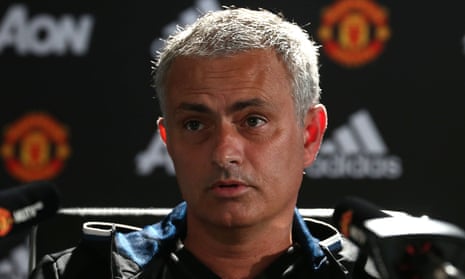José Mourinho strolled to his seat, offered a smile, and said: “First of all, good morning to my friends from the media.” This was a breezy start and mischievous reference to his critics – “Einsteins” as he calls them – who have offered analysis of why Manchester United have lost three of their last four games.
Two of these matches have been in the Premier League and, as United are six points behind Manchester City, the need for the under-fire Mourinho to beat Leicester City in the early kick-off at Old Trafford on Saturday is clear, but he was, in the main, in relaxed mood.
There was a joke about him being “the worst manager in the history of football”, and a humorous expansion on the Einstein theory: “The Einsteins need money to live, they can’t coach, they can’t sit on the bench, they can’t win matches. They can speak, they can write, they can criticise the work of other people, but I am a good man. I am a good man of goodwill. I do lots of charity, I help so many people, so why not also feed the Einsteins? That’s fine.”
Wednesday’s 3-1 win at Northampton Town in the EFL Cup offered some relief and Mourinho was happy to discuss the public criticism of his players. A clear message was sent to Jesse Lingard, Luke Shaw, Eric Bailly, Henrikh Mkhitaryan and Daley Blind, all of whom have been criticised during United’s poor run of form.
He agreed that footballers can be overly sensitive to negative words in public and they should be able to handle criticism – “it’s their job” – though he acknowledged each individual may adopt a varying approach.
“Everyone is a different person. Everyone analyses things in a different way,” said the manager. “Some read every word [that’s said about them], some don’t read [at all]. It depends. Some are affected by it. Some are not. Many times you – when I say you, media and Einsteins – you forget there are family and kids and parents and wives and girlfriends [around these players]. People forget that and people react in different ways. The way they react can also affect the way the player reacts.
“I can’t be in their heads to try and analyse what they feel and the way they feel it. I just feel that [criticism] is part of the job and you have to look at in this way. It’s part of the job and it’s part of your culture and part of the culture of this country.”
Mourinho believes the level of negativity his and other teams attract is partly due to the national side’s poor record at major tournaments. “I know this, in spite of not being English, I have been here many years, I know one of the reasons of the English disaster over the years in the Euros and in the World Cups,” he said. “But I still think it’s part of the job. You have to cope with it, you have to realise you are very lucky to be in our position.”
The only point when Mourinho’s breezy manner disappeared came when he was forced to answer questions about claims in a new book that the Portuguese once said he wanted to “break [Arsène] Wenger’s face”. When asked if this was true Mourinho became terse and tense. “I am happy. He [the author] made his money, that is fine for me,” he said, meaning, of course, the precise opposite. Pressed about the quote, Mourinho said: “Well, I met Arsène Wenger a couple of weeks ago and like civilised people we shook hands, we sat on the same table, we had dinner together with other people, we exchanged ideas. We were speaking because we are civilised people and I don’t think the book will be in the gallery of the Shakespeares and so on and I prefer just not to comment. It is my last word about it and again I repeat: he is making his money. That’s fine by me.”
The Portuguese is the subject of a new biography, José Mourinho – Up Close and Personal, which is being serialised in the Daily Mail and earlier in the day Wenger had been his usual urbane self when asked about the alleged comments. “Look, I haven’t read the book and I certainly won’t read it,” he said. “I cannot comment on that. I talk about football and that’s all I do. I’m not in a destructive mode, ever. I’m more constructive and I cannot comment on that because I’m focused on tomorrow’s game and how we want to play football.”
After the uncomfortable moment discussing the book Mourinho was again at ease and, like Wenger, keen to focus on football and the challenge before him and his players.
Despite the disappointing league form and the defeat at Feyenoord in the Europa League the sense was of a man supremely confident he will turn United around. Mourinho was most impressive when, in full command of the room, he reminded himself and everyone at the club of how fortunate they are. “You must be very lucky to be Manchester United manager, Man United player, Man United physio, Man United doctor, Man United kit man,” the 53-year-old said. “You have to be very lucky, so feel good and fight hard.”
The positivity here was reflected in Mourinho’s view of the challenge before him: that of winning United a 21st championship. “I always said since day one that my title ambitions were also a motivational factor, a way of living,” he said. “I don’t understand how to be in this club and give a different message.”
